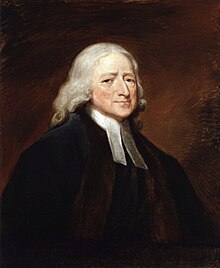John Wesley
John Wesley (1703–1791) was an Anglican clergyman, theologian, and evangelist, best known as the founder of Methodism, a movement that revived Christianity in the 18th century and became one of the most significant Protestant denominations worldwide. Wesley’s lifelong work in preaching, education, and social reform has left an indelible mark on Christianity, especially in the areas of evangelical revival and social justice.
Early Life and Family Background
John Wesley was born on June 28, 1703, in Epworth, Lincolnshire, England. He was the fifteenth child of Samuel Wesley, an Anglican rector, and Susanna Wesley, a remarkable and devout mother whose spiritual teachings greatly influenced her children. John’s father was also a well-educated priest and poet, but it was Susanna’s piety and rigorous religious instruction at home that deeply shaped John’s early understanding of faith.
When John was five years old, he narrowly escaped death in a fire that destroyed the family rectory. This event became a significant part of Wesley’s life narrative, as he later referred to himself as “a brand plucked from the burning” (a reference to Zechariah 3:2), which he interpreted as a divine sign of his future purpose.
Education and Early Ministry
In 1714, Wesley was sent to the Charterhouse School in London, where he excelled academically. He later attended Christ Church, Oxford, one of England’s most prestigious universities. It was at Oxford that Wesley’s religious conviction deepened. He was ordained as a deacon in 1725, and by 1728, he was ordained as a priest in the Church of England.
In the year of his ordination, he read Thomas à Kempis and Jeremy Taylor, showed his interest in mysticism, and began to seek the religious truths which underlay the great revival of the 18th century. The reading of William Law‘s Christian Perfection and A Serious Call to a Devout and Holy Life gave him, he said, a more sublime view of the law of God; and he resolved to keep it, inwardly and outwardly, as sacredly as possible, believing that in obedience he would find salvation. He pursued a rigidly methodical and abstemious life, studied Scripture, and performed his religious duties diligently, depriving himself so that he would have alms to give. He began to seek after holiness of heart and life.
During his time at Oxford, Wesley became part of a group of students that included his brother Charles Wesley and George Whitefield, who dedicated themselves to spiritual discipline and charitable works. This group was derisively called the “Holy Club” because of their methodical approach to Bible study, prayer, and fasting. This methodical practice led to the term “Methodism,” though it was originally used in a mocking manner.
The Georgia Mission (1735-1737)
In 1735, John Wesley accepted an invitation to serve as a missionary in the American colony of Georgia. He aimed to minister to settlers and Native Americans but faced numerous challenges. His rigid High Church practices, which included strict adherence to liturgical rituals and moral discipline, alienated many colonists, and his time in Georgia ended in failure.
However, the experience had a profound impact on Wesley. On his journey to America, Wesley encountered a group of Moravians, a German pietistic Christian sect, whose calm faith during a life-threatening storm impressed him deeply. Wesley began to question the depth of his own faith and returned to England in 1738, feeling spiritually unfulfilled.
The Aldersgate Experience (1738)
Shortly after returning to London, Wesley experienced a profound spiritual awakening. On May 24, 1738, during a meeting at Aldersgate Street, where someone was reading from Martin Luther’s preface to the Epistle to the Romans, Wesley famously felt his “heart strangely warmed.” He wrote in his journal that he finally understood that salvation came through faith in Christ alone, and not through works or ritual. This event marked a pivotal turning point in his life, deepening his conviction and fueling his evangelical fervor.
The Founding of Methodism
Following his Aldersgate experience, Wesley began preaching with new zeal. His emphasis on personal salvation, holiness, and the power of God’s grace attracted large crowds. Along with his brother Charles Wesley, who became a prolific hymn writer, and George Whitefield, Wesley started preaching in the open air, particularly to working-class people who were often neglected by the established church.
Field preaching became a hallmark of Wesley’s ministry. Unlike traditional clergy, Wesley preached in fields, marketplaces, and town squares to reach people who were not attending church. His sermons stressed the importance of a personal relationship with Jesus Christ, the experience of conversion, and the pursuit of a holy life.
In addition to preaching, Wesley organized converts into small groups called “societies” for mutual support, worship, and discipleship. These societies were divided into smaller “classes” of about 12 people, which provided accountability and encouraged personal growth in faith. These group structures allowed Methodism to spread quickly and take root as a lay-driven movement.
Wesley’s Theological Views
Wesley’s theology was heavily influenced by Arminianism, in contrast to the prevailing Calvinist doctrine of predestination that was widespread in some Protestant circles, including his colleague George Whitefield. Wesley believed in free will, teaching that salvation was available to all people through faith in Jesus Christ. He emphasized the concept of “prevenient grace”, the idea that God’s grace precedes and enables human decisions to seek Him. Wesley also championed the doctrines of sanctification and Christian perfection, teaching that through God’s grace, Christians could grow in holiness and experience freedom from the power of sin.
Social Reform and Advocacy
John Wesley was not just concerned with spiritual matters but also social justice. His Methodist movement was known for its advocacy on behalf of the poor, the oppressed, and those suffering from social injustice. Wesley was an outspoken critic of slavery, which he condemned as “that execrable sum of all villainies.” He also campaigned for prison reform, the abolition of the slave trade, and better working conditions for laborers.
Wesley’s practical approach to Christianity included founding schools, orphanages, and medical clinics. He also encouraged literacy, publishing sermons, tracts, and theological works aimed at educating ordinary people. One of his more famous publications was his “Primitive Physick”, a medical guide that offered practical health advice based on his interest in medicine and public health.
Legacy and Death
Despite his commitment to reforming the Church of England, Wesley’s followers eventually separated into a distinct denomination after his death. This was not Wesley’s intention—he remained an Anglican priest throughout his life—but the movement he inspired grew too large and distinct to remain within the established church. In 1784, when the Methodist movement spread to America, Wesley reluctantly ordained preachers, breaking Anglican tradition.
John Wesley continued to preach until the very end of his life. He died on March 2, 1791, at the age of 87, in London. His final words were reported to be, “The best of all is, God is with us.” By the time of his death, Methodism had tens of thousands of followers in Britain and America, and its influence continued to grow, eventually becoming one of the most important Protestant movements globally.
Methodism Today
John Wesley’s legacy lives on through the Methodist Church, which has millions of members worldwide. His emphasis on personal faith, social justice, and disciplined Christian living remains central to Methodism. Wesley’s theological contributions, particularly his teachings on grace, sanctification, and Christian perfection, continue to influence Christian thought across various denominations.
In summary, John Wesley’s life was one of passionate faith, tireless work, and enduring influence. His leadership in the Methodist revival changed the face of Protestant Christianity, bringing new spiritual vitality to the church and impacting society in profound ways.

